By Jim Davis - Florida Catholic
MIAMI | South Florida's two Catholic universities have announced fall classes — video as well as onsite — as part of detailed programs to continue to teach in the face of the ongoing COVID-19 pandemic.
Both universities are relying heavily on guidelines from the Centers for Disease Control, with a few individual tweaks. But David Armstrong, president of St. Thomas University, voiced a common sentiment.
"We're going to provide education to you in any way we can," he said via a recent YouTube video which introduced the plan he called "Bobcat Go."
The plan calls for in-class and virtual instruction at the same time, with a camera and monitor in each classroom. Students who can't come to class, or may be concerned about COVID-19, can still do their classwork.
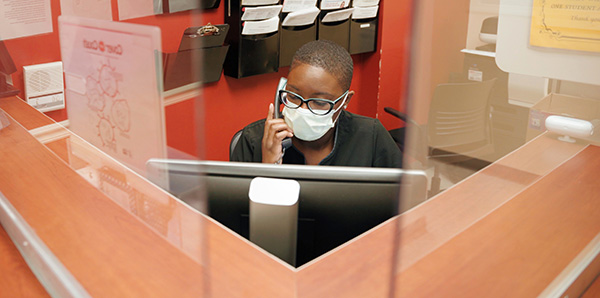
Photographer: COURTESY
At Barry University, Plexiglas dividers have been installed at desks where office workers deal with students or the public.
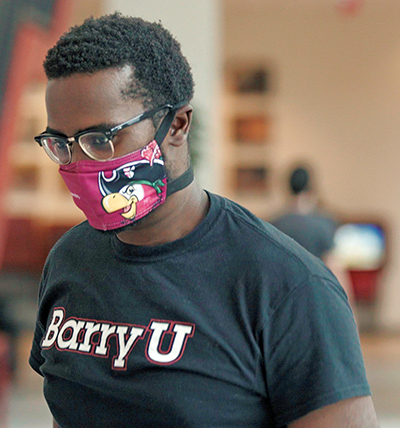
Photographer: COURTESY
A student models the face mask, branded with Bucky the Barry University mascot, that the university will give everyone who works and studies there.
The plan, however, will unfold in two stages. Some video instruction is scheduled to start on Saturday, Aug. 15, 2020, with other classes opening by the following Monday.
Fall attendance may well match or exceed the 4,824 who attended a year ago, according to Jeremy Moreland, STU's provost and chief academic officer.
"We're welcoming everyone to the campus, and some people back to campus," Moreland said. "But we're building in flexibility. Some students have asked, 'Do I really want to get started with a long semester?' Our answer is, 'Yes — you can continue, whether you attend physically or not.'"
For those who do attend physically, STU is preparing a range of measures similar to those at grocery stores and parish churches. They include:
- Temperature checks for all visitors.
- A face mask requirement, with some masks available for anyone who has forgotten theirs.
- A six-foot distancing rule for all queues.
- Blocking out some seats and desks, to make students sit farther apart.
Off campus, STU will urge students to beware the kinds of public places — such as beaches, bars and restaurants — that have become breeding grounds for coronavirus outbreaks.
"We want students to enjoy South Florida," Moreland said. "But we'll ask them: 'Is it in your best interest to go where you'll have increased risk of exposure?'"
Across town in Miami Shores, FlexLearning is the buzzword at Barry University, which is set to resume classes Aug. 24, 2020.
As with St. Thomas University, Barry's expected 7,000-plus incoming students will be able to attend class in person or remote, via the Webex video conferencing app. Students will be allowed to pivot between the modes as well.
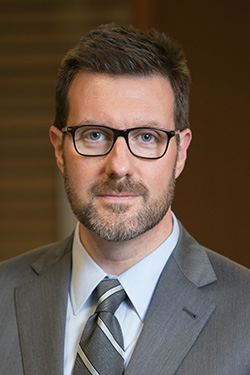
Photographer: COURTESY
Jeremy Moreland, provost of St. Thomas University, is warning students to beware of going to off-campus bars and restaurants.
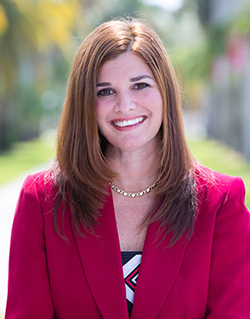
Photographer: COURTESY
Barry University is trying a "flexible learning model," according to Jennifer Boyd-Pugh, its vice president for university administration.
"It's a flexible learning model," said Jennifer Boyd-Pugh, vice president for university administration. "Maybe someone is in a vulnerable population, or lives with vulnerable people."
For campus attendance, everyone will get a face mask branded with Bucky, the school's pirate parrot mascot. Visitors to campus must wear masks also.
Classroom teachers will get face shields for teaching. They’ll also stand behind mobile podiums with Plexiglas in front.
In other measures at Barry:
- A 25-minute training session will brief students on campus practices like distancing and frequent hand washing. Also offered will be a few "mini-modules," about five minutes each, for issues like stress management.
- Plexiglas dividers will go up at desks where office workers deal with students or the public.
- Everyone will be asked to ride elevators no more than two at a time.
- Study halls will have small tables with one chair each.
Hand sanitizer dispensers will abound at both campuses. So will signs and markers to designate walking lanes, and to remind people to wear masks and wash their hands often.
Barry posts its anti-COVID measures via its Back to Barry web page. The page also has a 39-page booklet that can be downloaded.
The university is also preparing to handle any actual infections. Boyd-Pugh said two newly purchased machines will be able to test for the coronavirus within 15 minutes.
Everyone is being asked to run through a daily self-check for COVID symptoms such as fever, coughing and loss of taste or smell. If they detect symptoms, they're expected to report via phone or e-mail and allow a test. Then they must self-isolate, in one of several onsite rooms if need be, while awaiting results.
Barry has also created a group of contact tracers to track any contagion that may arise, Boyd-Pugh said.
Barry is currently trying to rethink group activities like investiture, a ceremony in which new students would get a class pin and hear a welcome talk by university president Mike Allen.
One alternative may be social media, Boyd-Pugh said. That's what medical students did this past spring when they took the Hippocratic Oath. Instead of a physical gathering, the event ran on Webex and Facebook Live.
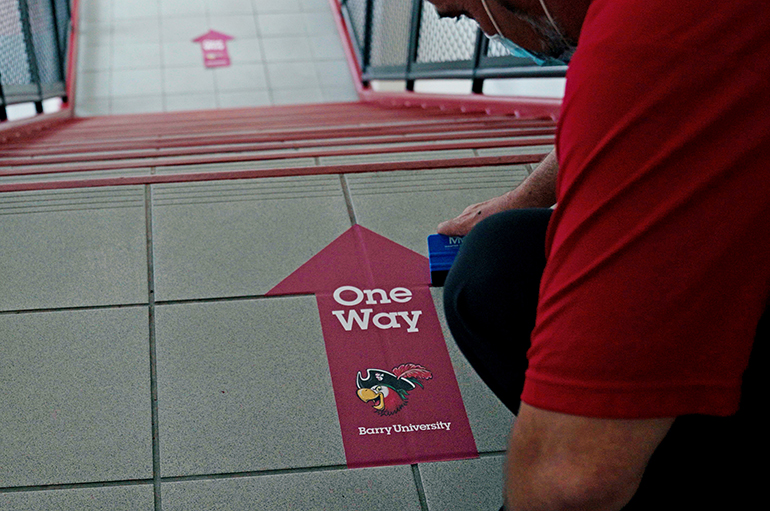
Photographer: COURTESY
Both Barry and St. Thomas universities will have signs and markers for directing traffic.

